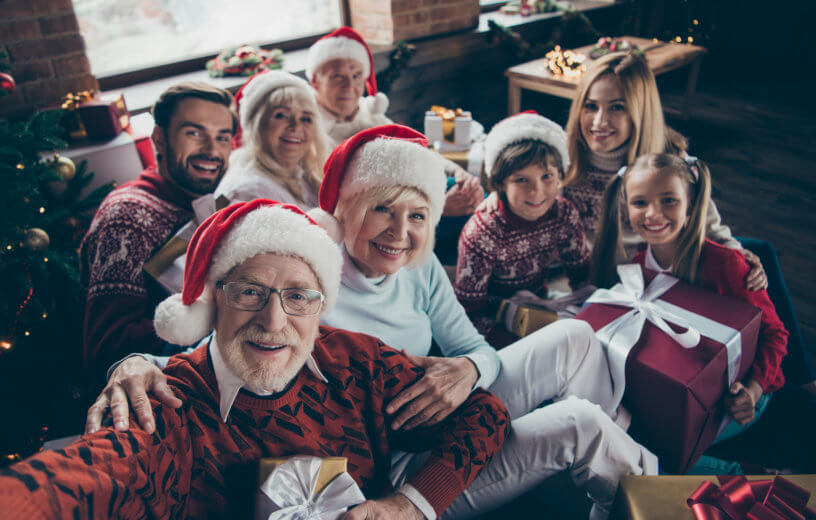NEW YORK — Thinking of hosting friends and family overnight this holiday season? You may want to think twice before inviting out-of-towners to stay with you.
A survey of 2,000 Americans (split evenly by generation) finds that those hosting friends and family during the holidays lose 2.5 hours of sleep per day when preparing to have others in their home. Of all the generations, Gen Z are the most likely to lose at least four hours of sleep per day while prepping for guests.
Usually, 32 percent of respondents say they’re both hosts and guests at some point during the holidays, while one in six only host people or only stay as guests. Commissioned by Serta Simmons Bedding and conducted by OnePoll, results showed that Gen Z respondents are most likely to host guests, while millennials are among the top to stay over as guests.
For anyone who wants to ensure that they are not overstaying their welcome, 49 percent of people think spending four days or more as a guest is too long. Guests seem to be mindful of this unspoken rule. When hosting others, 79 percent say their guests stay four nights or less.
As guests, Gen Z (70%) and baby boomers (85%) aren’t shy. When staying with their partner at their family’s home, they’re less likely to feel awkward about sleeping in the same bed compared to Gen Xers (30%) and millennials (31%).
Holiday guests need to get on their host’s schedule
No matter how long people spend visiting their loved ones during the festive season, results found it can affect respondents’ sleep in various ways. Those who are guests during the holidays report that their sleep schedule was disrupted — 75 percent feel compelled to go to sleep and wake up at the same time as their host. This was especially true for younger guests: 83 percent of Gen Z guests match their hosts’ sleep schedule, compared to only 61 percent of baby boomer guests.
“Whether hosting guests or staying with a friend or family member this holiday season, it’s important to prioritize a good night’s sleep,” says JD Velilla, head of sleep experience at Serta Simmons Bedding, in a statement. “When and where possible, try to stick to your normal routine, which may include daily exercise, consistent mealtimes and sleep/wake times and pre-sleep activities like meditation.”
Regardless of whether they’re sleeping in their own bed or not, more than a third of respondents (34%) say the holidays are the most sleepless time of the year.
Younger respondents were more likely to agree: 40 percent of Gen Z and millennials say it’s the most sleepless time, compared to 31 percent of Gen X and just 24 percent of baby boomers.
Why might this be a sleepless season for Americans?
Some of the top reasons include excitement for the season (33%), stress around prepping for guests (25%), indulging in too many holiday treats and holiday movie marathons (21% and 20%, respectively).
“While there are a number of reasons keeping people awake, there are also some ways to ensure you’re getting a good night’s rest. Try to re-create your at-home sleep experience with easy-to-pack white noise machines, aromatherapy pillow sprays and even your favorite pajamas,” Velilla says.
Gracious hosts across the country are doing what they can to ensure their houseguests sleep well, with 70 percent of hosts sharing that they make special adjustments to guest beds and rooms during the holidays. However, there are some who aren’t waiting for their hosts to set up the right sleeping environment for them. Thirty percent of guests actually bring their own bedding when staying over, with millennials most likely to do so (37%). Another 12 percent want to but are worried about offending their host.
Although, those who are worried about offending the host, don’t need to be, as seven in 10 Americans shared that they wouldn’t feel very insulted, if at all.
When it comes to additional adjustments to get ready for guests, only seven percent of hosts hide valuables, while one-quarter of guests admit they would snoop in the nightstand. Of guests surveyed, Gen Zers are the most likely to snoop in nightstands (30%), compared to just 16 percent of baby boomers.
For hosts looking to get a head start on cleaning up after their guests, be careful not to bring out the vacuum too early. Research shows that baby boomers are most likely (70%) to consider it offensive to start cleaning up the guest bedroom before guests have left, while their Gen Z counterparts are least likely (53%) to feel slighted.
When it comes to guests, baby boomers are most likely to always clean up after themselves when staying over at someone’s home (72%).
Survey methodology:
This random double-opt-in survey of 2,000 Americans (split evenly by generation) was commissioned by Serta Simmons Bedding between Oct. 19 and Oct. 27, 2022. It was conducted by market research company OnePoll, whose team members are members of the Market Research Society and have corporate membership to the American Association for Public Opinion Research (AAPOR) and the European Society for Opinion and Marketing Research (ESOMAR).

“ If you’re in my me….., Keeo going “!